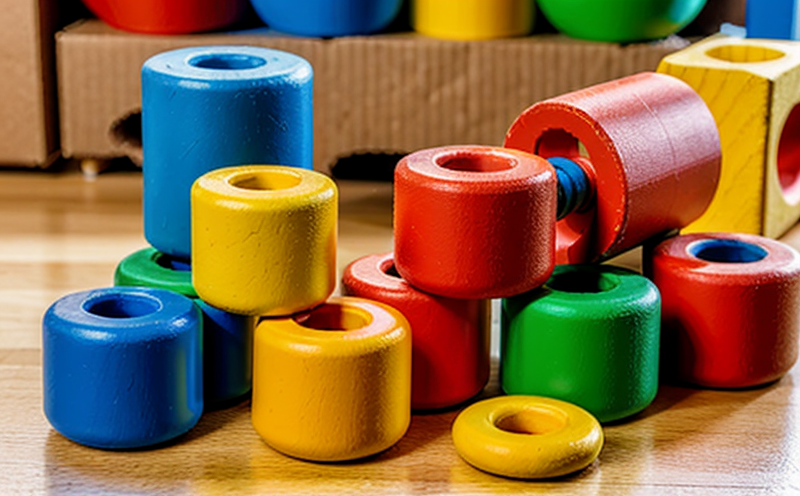Ensuring that materials used in toys retain their strength under torque-related stress
The Crucial Role of Torque-Related Stress Testing in Ensuring Toy Materials Retain Their Strength
In the world of toy manufacturing, ensuring that materials used in toys retain their strength under torque-related stress is a critical aspect of product safety and compliance with regulatory standards. As a leading laboratory service provider, Eurolab understands the importance of this testing process in preventing injuries, recalls, and damage to brand reputation.
Torque-related stress occurs when a force is applied to an object, causing it to twist or rotate around a central axis. This type of stress can lead to material failure, especially in toys that are designed for children who may use their imagination to apply excessive force. To mitigate this risk, toy manufacturers must subject their products to rigorous torque-related stress testing to ensure that materials retain their strength and safety standards are met.
Why Ensure Materials Retain Their Strength Under Torque-Related Stress?
The advantages of conducting torque-related stress testing on toys are numerous
Enhanced Safety By identifying potential material failures, toy manufacturers can modify their designs or substitute materials to prevent accidents.
Compliance with Regulatory Standards Toys must meet strict safety standards set by regulatory bodies such as the Consumer Product Safety Commission (CPSC) and the European Unions Toy Safety Directive. Torque-related stress testing helps ensure compliance with these regulations.
Reduced Liability By demonstrating a commitment to product safety, toy manufacturers can reduce their liability in case of accidents or injuries caused by defective products.
Increased Consumer Trust Toy manufacturers who prioritize material strength and safety through torque-related stress testing can build trust with consumers, leading to increased brand loyalty and sales.
Improved Product Design The data generated from torque-related stress testing can inform product design improvements, resulting in more durable and safer toys.
Key Benefits of Torque-Related Stress Testing
Here are the key benefits of torque-related stress testing in a concise bullet-point format
Material Characterization Identify material properties under different types of stresses to determine their ability to withstand loads.
Failure Mode Analysis Determine the likelihood and impact of material failure, enabling design modifications or substitutions.
Product Optimization Refine product designs based on test results, ensuring safety standards are met while minimizing costs.
Qualification Testing Verify product compliance with regulatory requirements by demonstrating adherence to industry standards.
Certification and Compliance Obtain certifications (e.g., UL, EN, or ISO) that demonstrate a commitment to quality and safety.
QA Section Common Queries About Torque-Related Stress Testing
Here are answers to frequently asked questions about torque-related stress testing
What types of toys require torque-related stress testing?
Toy manufacturers should conduct this testing on products with moving parts, high-stress areas (e.g., joints or pivots), and materials prone to cracking or breaking under torsion.
How often should toys be re-tested for torque-related stress?
Regular testing is recommended to ensure that toys continue to meet safety standards as materials degrade over time due to wear-and-tear, exposure to chemicals, or other environmental factors.
Can any laboratory conduct torque-related stress testing?
While many laboratories can perform basic material tests, specialized expertise and equipment may be necessary for advanced torque-related stress testing, such as those required by regulatory agencies.
What kind of data is generated from torque-related stress testing?
This process yields detailed information about a products behavior under different loads, including material failure modes, critical load values, and areas requiring design improvements.
Conclusion
In conclusion, ensuring materials used in toys retain their strength under torque-related stress is an essential aspect of product safety, regulatory compliance, and brand reputation. By partnering with Eurolab to conduct torque-related stress testing on your products, you can protect consumers, enhance brand value, and stay ahead of industry trends.
-
Testing the rotational strength of components in toys and juvenile products
-
Verifying that toy parts, such as screws and fasteners, remain secure under twisting forces
-
Assessing the durability of rotating parts, such as wheels or gears, under torque stress
-
Ensuring that toys with moving parts are safe and durable under twisting motions
-
Testing toys to ensure that fasteners and joints are not prone to loosening or detaching
-
Simulating real-life twisting actions that children might perform on toys
-
Verifying that products with rotating components can handle the torque generated during use
-
Testing toys and products for compliance with torque-related safety standards
-
Evaluating the resilience of toys with handles, knobs, or turning mechanisms under torque
-
Ensuring that toys do not break or malfunction when subjected to rotational stress
-
Testing the ability of toys with screw-in parts to withstand twisting forces without damage
-
Simulating continuous twisting and turning motions to evaluate product durability
-
Ensuring that toy components designed for rotation remain intact under twisting or turning
-
Testing the ability of toy joints and connections to withstand torque without loosening
-
Verifying that products with rotating parts do not present safety hazards when under stress
-
Simulating various torque forces to ensure toy durability in different play scenarios
-
Verifying that battery compartments and other parts remain secure under twisting or torquing
-
Testing how toys with multiple components, like puzzles or constructions, hold up under torque
-
Assessing the effect of torque on the longevity and safety of juvenile products
-
Evaluating the force at which toy parts break, detach, or malfunction under twisting actions
-
Ensuring compliance with international torque testing standards for toys and juvenile products




